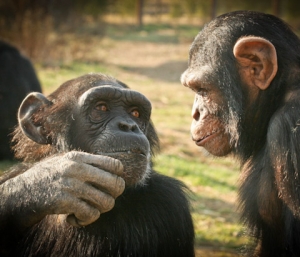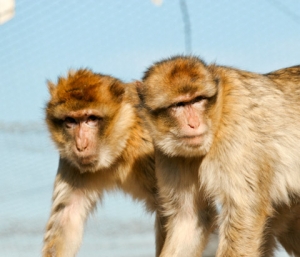Our Primates
Chimpanzees and MacaquesWhat we do with them
“In our center, we rescue and rehabilitate abused chimpanzees and macaques coming from circus, television, or private collections”
What we do with them
“In our center, we rescue and rehabilitate abused chimpanzees and macaques coming from circus, television, or private collections”
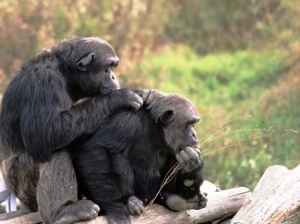
The chimpanzees and macaques living in MONA are animals that have been confiscated from their abusive and illegal settings and have had a very difficult or even cruel past. Many of them were used in show business. Sometimes, human families attempt to raise these primates in their homes like children. However, when they reach adolescents, they become uncontrollable and are locked into small cages. These primates have been separated from their mothers too early and don’t have the opportunity to establish social bonds with their peers. They have a hard time understanding what they really are: wild animals or humans. Isolation, loneliness and the unfortunate treatment of their previous caregivers cause physical and psychological problems, which they try to recover from with a new life with help of the MONA Foundation.
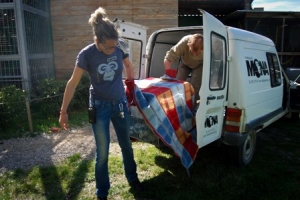
After we are alerted of the presence of a primate, our first step is to contact SOIVRE offices in Madrid, the institution responsible for controlling the species under the CITES convention. Once officially determined that the animal is in an illegal or abusive situation, we get to work to get everything ready for the rescue. To prepare, we coordinate permits for the retrieval of the animal and seek the most appropriate means of transportation (airplane/van). Generally, animals are not transferred to our center by third parties; we carry out the rescue ourselves. Long before the arrival of the new animal at the center, a number of health checks are performed. Normally, part of our team goes to the rescue site for the first health tests in person. These health tests are repeated again the day of the transfer and then once again in quarantine.
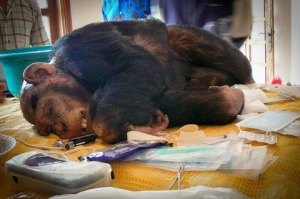
Recovery is a very long road. After we remove our primates from their owners or the entertainment industry, they often arrive at MONA in poor physical and deplorable psychological conditions. The first step on the long road to recovery is resocialization. In nature, primates are very social beings. So far, resocialization is the only way to provide any captive chimpanzee or macaque the opportunity to become a normal, social individual. However, it is a very long, complicated, and expensive process and sometimes a complete and total recovery is impossible.
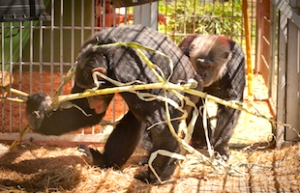
Unfortunately, our primates never had the opportunity to learn the knowledge and skills necessary to survive on their own in the wild. However, here at MONA, we can give them the possibility of developing these typical behaviors of wild primates by offering them a large natural enclosure in the presence and company of their own species.
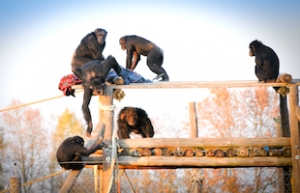
Currently, there is a general consensus that social primates need the company of other individuals of their species. From the point of view of animal welfare, it is very important for these social animals to live in conditions that allow them to develop a large repertoire of typical behaviors of their species. Thus the animal’s welfare is directly proportional to the integration it has in a group.
The Mona Foundation depends heavily on volunteer helpers to continue its work. Volunteers are responsible for many of the tasks involved in the day-to-day care of primates at our sanctuary. We ask for a mínimum commitment of six months and in exchange for your time and dedication, we offer volunteers a truly unique opportunity and training as a captive primate carer. Our sanctuary is one of few, if not the only one, to offer volunteers with no prior experience in this field, such an opportunity. Thanks to this, our volunteers are well equipped with basic and practical primate husbandry knowledge.
So get involved and help us care for our primates. For information on volunteer requirements and specific conditions at our sanctuary please email us at a.gomara@fundaciomona.org
| PROJECT NAME | Fundació MONA |
| CONTINENT | Europe |
| COUNTRY | Spain |
| ANIMAL SPECIES | Chimpanzees and Barbary macaques |
| INTERNET | www.fundacionmona.org |
| a.gomara@fundacionmona.org | |
| PHONE | +34 972477618 |
| ADDRESS | FUNDACIO MONA Veinat de l’estació, Carretera de Cassà, s/n 17457 Riudellots de la Selva-GIRONA (Spain) |
| PROJECT DESCRIPTION | The Mona Foundation was set up to end the exploitation of primates coming form shows or have been pets. The foundation has established a sanctuary near Girona in Spain, which provides a home where rescued chimpanzees and other primates can live in a semi-natural environment and where people can be inspired to understand and respect wild animals. |
| TYPE OF JOB / DAILY ACTIVITIES | *Animal kepper: A keeper’s basic role is to clean the primate’s rooms and outside enclousers, prepare and give their food, and develop ways of keeping their minds and bodies active (environmental enrichment). Please be aware that the work is hard and it is mostly a routine and in the beginning it can seem monotonous. At first and while you get to know the chimps and them to know you, you may have to help with office work, fundraising or help with one of the many research projects undertaken by Mona.*Required to work five days a week, beginning at 9am and finishing between 7 and 8pm depending on the season. |
| REQUESTED PERSONAL SKILLS | High self motivated, physically and mentally fit, able to follow instructions and able to work with a team and alone, must have initiative and autonomy. Be emotionally mature, energetic, patient and positive. |
| MINIMUM / MAX STAY | 3 months (people with experience with primates) 6 months if not. |
| HABITAT & CLIMATE | Summer : really hot and humid and because of that we have a lot insects! Maximum temperature can reach 35º C. Hotest months (June, July, August, September)Winter : can be really cold. Min. temperature : -5º C. Coldest months (November, December, January, February) |
| ACCOMODATION | Not included. Volunteers must find a place to stay. The average price of renting a room in Spain is about 150-300 euros per month. |
| REQUESTED VACCINATIONS | TBC Test done 2 weeks before arrival and Hepatitis A and B (must supply a copy) |
| SPOKEN LANGUAGES | Preferably Spanish, if not English with some knowledge of Spanish or Catalan. |
| MINIMUM AGE | 20 years old. |
| CONTRIBUTE (COSTS) | 60 euros for tramits and insurance +100 euros diposit,one month before arrival (that will be returned after the stay) |
| CLOSEST AIRPORT | Girona airport |
| PICK UP SERVICE | YES, but only from train station in town or Girona Airport |
| VISA / DOCUMENT | Non EU Volunteers should try to get the Visa permits for at least 6 months. |
| PICTURES / NOTES | Appliers must send us their C.V, including a letter detailing their motivation, one letter of recommendation, date of birth and updated photo. Ask for positions available |


